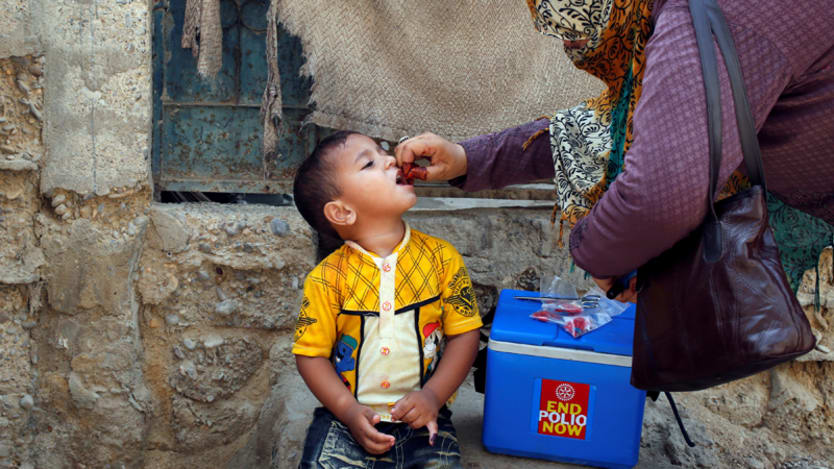
MANILA — The Global Polio Eradication Initiative hopes to use novel oral polio vaccines and adopt smartphone technologies in the next five years, under a new strategy unveiled on Tuesday.
Several novel oral polio vaccines designed to eliminate the risk of vaccine-derived polio cases are currently being developed by PATH and partners. Two of them targeting the type 2 strain are in the more advanced stages of clinical trials and are being tested for safety. If proven effective, the vaccines could be available by 2020 in small quantities, Michel Zaffran, director of polio eradication at the World Health Organization, said during a media briefing on the new strategy.
“The last mile has proven to be the toughest phase of the polio eradication.”
— Michel Zaffran, director of polio eradication, WHOMeanwhile, smartphone technologies such as e-Surve will help in disease surveillance and faster response. e-Surve is a mobile application that allows for a quick and effective collection and analysis of surveillance data and has been introduced by WHO in several parts of Africa.
GPEI is also planning to establish a regional hub in Amman, Jordan, allowing for easier coordination and increased technical support for polio vaccination programs in the two polio-endemic countries of Afghanistan and Pakistan.
More on polio:
► WHO says international spread of polio still a public health emergency
► How polio campaigners won €55M for their fight
► Opinion: One of the greatest days of the human race is within reach
UNICEF and WHO are also setting up rapid response teams that can be immediately deployed for surge capacity in case of a polio event or outbreak. The initiative is also expanding its partnership with development institutions, including Gavi, the Vaccine Alliance, which is now part of the Polio Oversight Board.
“There's actually a working group currently established to identify opportunities for GPEI to engage with Gavi. The program will also be developing joint results and accountability framework with Gavi to help operationalize some of these strategies and leveraging polio assets more effectively in support of routine immunization,” said Jalaa Abdelwahab, senior health adviser and deputy director at UNICEF’s global polio team.
These are just some of the new approaches GPEI will be implementing under its new strategy from 2019 to 2023. It comes on the heels of a successful strategy that led to the eradication of polio in many parts of the world, including in the Southeast Asia region, which is now declared polio-free. Four out of 5 people in the world now live in regions that have been certified as free of the wild poliovirus, Zaffran said.
But the strategy is also a painful reminder of what the international community failed to achieve in the past five years — the eradication of wild poliovirus, which remains endemic in Afghanistan and Pakistan. Some polio outbreaks have also been reported in countries including Indonesia, Mozambique, Niger, Nigeria, Papua New Guinea, Somalia as well as in the Democratic Republic of the Congo, which is experiencing its worst Ebola outbreak.
The hope is that this new strategy will be the last from GPEI, and that wild poliovirus will finally be eliminated by 2023.
But the last steps are known to be the most challenging. There is still resistance to the vaccine, for example in Pakistan, where insecurity and misinformation compound the problem.
“The last mile has proven to be the toughest phase of the polio eradication. We have yet to stop transmission in some of the most difficult-to-reach areas of the world,” Zaffran said.
Zaffran and Abdelwahab admit there is a threat of fatigue among frontline health workers, but that efforts are being made to prevent that from escalating. In both Pakistan and Afghanistan, for example, an assessment is underway to identify strategies to invigorate teams and offer assistance — including security via national authorities — to ensure they continue to deliver on the eradication initiative, Abdelwahab said.
Donor fatigue is another threat to polio eradication efforts. The new strategy is currently facing a funding gap of $3.27 billion.
“We don't believe that we have the $3.27 billion committed. We think that we will be falling short of some commitments, and that's why we actually continue to reach out to new donors, bilateral and private donors, that could actually contribute to these efforts,” Zaffran said.
But the WHO polio director said some long-time donors have confirmed their continued support for GPEI’s work, such as Rotary International. Some bilateral donors that are members of the Development Assistance Committee of the Organisation for Economic Co-operation and Development, but who Zaffran would not identify, have also confirmed their support for the program, although it’s not yet clear how much. But he hopes to have more clarity before the pledging conference in November in Abu Dhabi, United Arab Emirates.
Search for articles
Most Read
- 1
- 2
- 3
- 4
- 5








